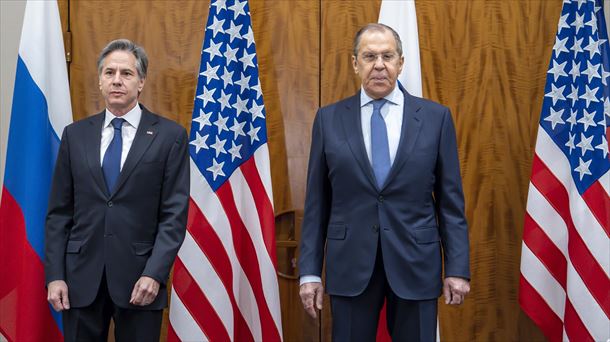The foreign ministers of both countries have met in Geneva in the midst of an escalation of tension, but without concrete results.
2:9


The meeting in Geneva between the Russian Foreign Minister, Sergei Lavrov, and its American counterpart, Antony Blink, whose purpose was to find formulas to reduce political and military tensions around Ukraine, ended after an hour and a half.
In the press conference after the meeting, Blinken stressed that Russia still has the possibility of choose the path of diplomacy, and that if he chooses the conflict over Ukraine “there will be serious consequences and international condemnation.”
“The United States and Europe are ready to meet Russia on either of these two paths,” he warned, conveying that Washington and its European allies “will continue to support Ukraine.”
Lavrov, for his part, has once again insisted that Russia poses no threat to the Ukrainian people and blamed the current situation on “anti-Russian hysteria” driven by a “Russophobic minority” that is setting the tone for the crisis.
Russia expected the US to come to the Geneva meeting with those answers, which it regards as formal guarantees. For the moment, the responses have been verbal, but the US delegation has tried to emphasize “the problems on the border between Russia and Ukraine, trying to condition everything else on the need for the de-escalation call.”
The Russian minister has indicated that after receiving these answers in writing and after his government examines them, it will be seen what is the way forward, although in principle there will be new diplomatic contacts between the two countries, but it is not possible to anticipate at what level.
Russia demands the withdrawal of foreign forces and their weapons from Bulgaria and Romania, a point included in the security guarantees that Moscow demands to prevent the expansion of NATO and the placement of offensive weapons near its borders.
According to the Ministry of Foreign Affairs, the Russian proposals “were formulated in a totally precise way that does not admit any type of double interpretation.”
In recent years, Russia has accused NATO of increasing its military presence and the deployment of weapons near its borders, from the three Baltic countries (Lithuania, Latvia and Estonia) to Poland, Romania and Bulgaria, strategic elements that Moscow considers a direct threat to its security.
In particular, Russia has condemned the emplacement of strategic elements of NATO’s anti-missile shield in Romania, as these can easily be repurposed for use as missile launchers.


Romania sees Russia’s request “unacceptable”
For its part, the Romanian Government has branded Russia’s demand for the withdrawal of NATO troops from Romania and Bulgaria as “unacceptable” and has thanked the commitment of allied countries to guarantee the security of the area against potential threats arising from From Russia.
Kingston is an accomplished author and journalist, known for his in-depth and engaging writing on sports. He currently works as a writer at 247 News Agency, where he has established himself as a respected voice in the sports industry.












